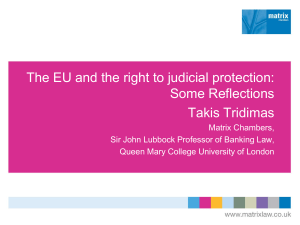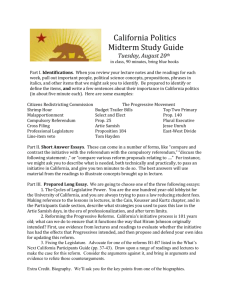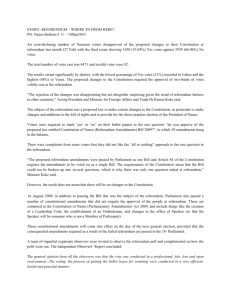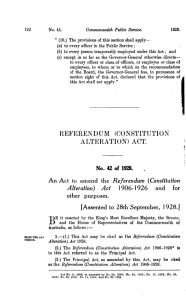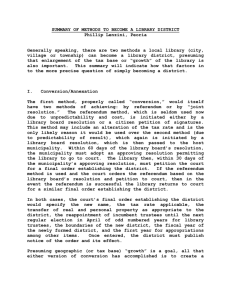recommendations
advertisement
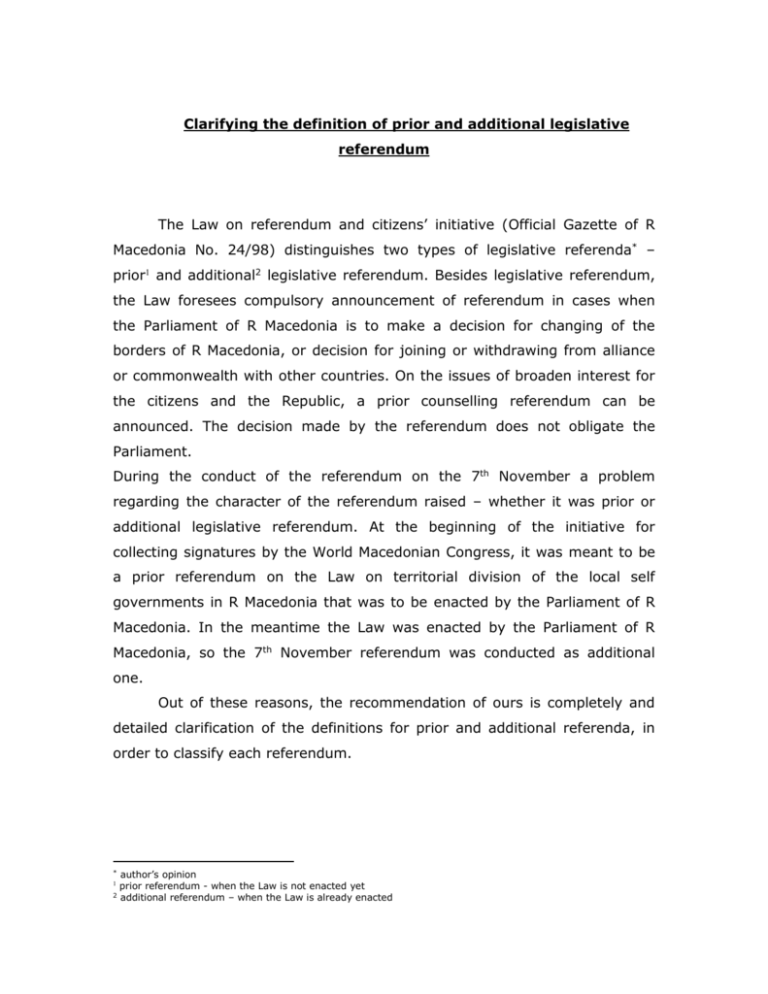
Clarifying the definition of prior and additional legislative referendum The Law on referendum and citizens’ initiative (Official Gazette of R Macedonia No. 24/98) distinguishes two types of legislative referenda* – prior and additional2 legislative referendum. Besides legislative referendum, the Law foresees compulsory announcement of referendum in cases when the Parliament of R Macedonia is to make a decision for changing of the borders of R Macedonia, or decision for joining or withdrawing from alliance or commonwealth with other countries. On the issues of broaden interest for the citizens and the Republic, a prior counselling referendum can be announced. The decision made by the referendum does not obligate the Parliament. During the conduct of the referendum on the 7th November a problem regarding the character of the referendum raised – whether it was prior or additional legislative referendum. At the beginning of the initiative for collecting signatures by the World Macedonian Congress, it was meant to be a prior referendum on the Law on territorial division of the local self governments in R Macedonia that was to be enacted by the Parliament of R Macedonia. In the meantime the Law was enacted by the Parliament of R Macedonia, so the 7th November referendum was conducted as additional one. Out of these reasons, the recommendation of ours is completely and detailed clarification of the definitions for prior and additional referenda, in order to classify each referendum. * 2 author’s opinion prior referendum - when the Law is not enacted yet additional referendum – when the Law is already enacted Clarifying the deadline for re-announcement of the referendum, as well as the deadlines for harmonizing the results of the referendum In accordance with the article 24 paragraph 2 of the Law on referendum and citizens’ initiative, the Parliament can not re-announce the referendum on the same question no later then 1 year after the previous referendum took place. But this provision stands only for prior legislative referendum, not for the other types of referenda. Since the 7th November referendum was conducted as additional legislative referendum, in the Law on referendum and citizens’ initiative there is no provision foreseeing the time needed to pass to re-announce the same referendum on the same question. Our recommendation is supplementation of the Law with new provision which will strictly determine the time limit of the re-run of the same additional referendum. In the context of the above mentioned remark, there is a need of supplementation of the article 25 of the Law on the referendum and citizens’ initiative, because this article foresees harmonization of the referendum results in cases of additional referendum, but does not define that issue in case of the prior referendum. Definition on pre-referendum campaign The way the pre-referendum campaign is conducted is not regulated by the Law on referendum and citizens’ initiative, but this Law invokes the provisions from the Law on election of the members of parliament regulating the election campaign. The Law on election of the members of the parliament contains many provisions regarding the campaign and the way of its conduct, but does not contain provision to define the election campaign. Our recommendation from the previous round tables was clarification of the election campaign, by which the control over the conduct of the campaign will be easier. In the context of that recommendation, is the proposal to approach to clarification of the pre-referendum campaign in order to distinguish it from the election campaign and to be regulated more detailed. Determination of the definition for pre-referendum campaign as well its detailed and accurate regulation is of a great importance for regular conduct of the referendum. Election Boards During the conduct of the referendum on the 7th November 2004, a problem raised in the way the election boards were constituted. The Law on referendum and citizens’ initiative invokes the provisions from the Law on election of the members of parliament on the way the election boards work and are constituted in the frame of the election administration. According to the Law on election of the members of the parliament, the election boards are consisted of president, four members and their deputies. The members of the election boards are appointed on the proposals from the political parties – two on the proposals from the ruling political parties and two on the proposals from the oppositional political parties. The referendum voting should not gain political character, so this kind of composition of the election boards causes a problem. Our recommendation is to make an equal decision in the frame of the Law on referendum and citizens’ initiative on the way the election boards will be constitute as non-partisan election bodies. *unofficial translation by MOST
